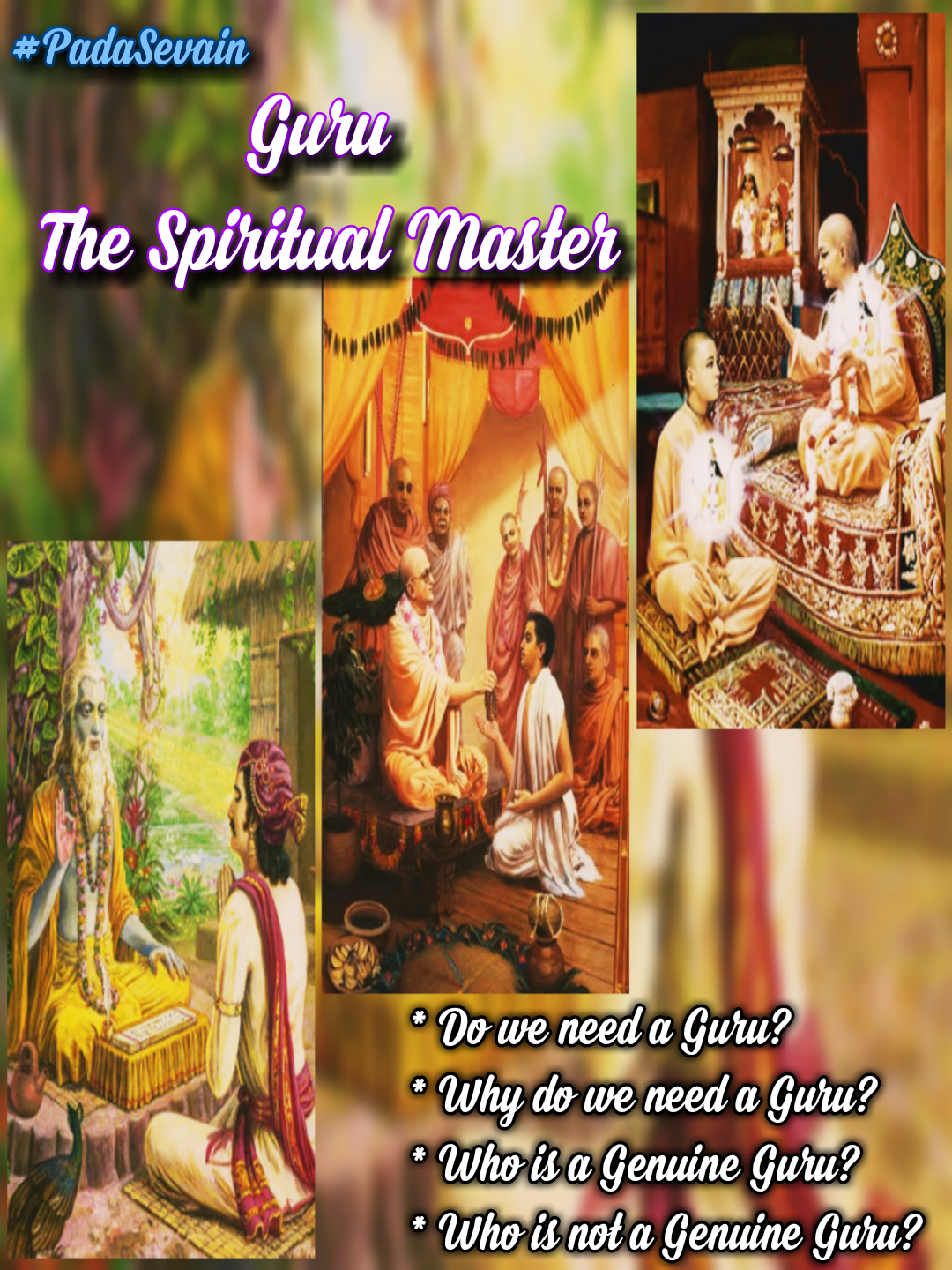In general today everyone wants to become the master and no one wants to be subservient to anybody. In this scenario when someone talks about accepting a guru or a spiritual master then no one is ready for it. Now the question comes to our mind is why no one wants to be under a master? This is because this material world is full of exploitation, almost everywhere we can observe that the master exploits the servants for their own benefit. This is the reason for many to not accept anyone as their masters, instead, there is always a competition to become the master of masters.
In contrast, the reality is that one has to be under a master to learn things in this material world and also if one wants the knowledge of the spiritual world.
Now the real problem is that we do have some knowledge about this world but how to find out the true spiritual master who has the knowledge of the spiritual kingdom. Especially when the world is filled with so many fake people and self proclaimed Godmen.
In the Caitanya-caritamrta it is said:
sarva-deśa-kāla-daśāya janera kartavyaguru-pāśe sei bhakti praṣṭavya, śrotavya “It is therefore the duty of every man – in every country, in every circumstance and at all times – to approach a bonafide spiritual master, question him about devotional service and listen to him explain the process.”(Sri Caitanya-caritamrta, Madhya-lila 25.122)
In the Mundaka Upanishad it is said
tad-vijñānārthaṁ sa gurum evābhigacchetsamit-panih śrotriyaṁ brahma-niṣṭham “To learn transcendental subject matter, one must approach the spiritual master. In doing so, in doing so one should carry fuel to burn in sacrifice. The symptom of such a spiritual master is that he is expert in understanding the Vedic conclusion, and therefore he constantly engages in the service of the Supreme Personality of Godhead.”(Mundaka Upanishad 1.2.12)
Also, the most munificent incarnation, Lord Caitanya Mahaprabhu, gave a very simple definition of guru as
kibā vipra, kibā nyāsī, śūdra kene nayayei kṛṣṇa-tattva-vettā, sei ‘guru’ haya “Whether one is a brāhmaṇa or a sannyāsī or a śūdra – regardless of what he is – he can become spiritual master if he knows the science of Krishna.”(Sri Caitanya-caritamrta, Madhya-lila 8.128)
By all these Vedic injunctions we can find out that based on one's mundane scholarship he can neither become nor to be considered as a guru or spiritual master. On this context Srimad-Bhagavatam states:
śabda-brahmaṇi niṣṇātona niṣṇāyāt pare yadi śramas tasya śrama-phalohy adhenum iva rakṣataḥ “If through meticulous study one becomes expert in reading Vedic literature but makes no endeavor to fix one’s mind on the Supreme Personality of Godhead, then one’s endeavor is certainly like that of a man who works very hard to take care of a cow that gives no milk. In other words, the fruit of one’s laborious study of Vedic knowledge will simply be the labor itself. There will be no other tangible result.”(Srimad-Bhagavatam 11.11.18)
In regard to this transcendental knowledge of the Vedas was first spoken by God, Krishna, to Brahma (the creator of this particular universe). From Brahma, the knowledge descended to Narada, from Narada to Vyasadeva, from Vyasadeva to Madhvacharya, and in this way, it was transmitted to the others until it reached Lord Caitanya Mahaprabhu. Lord Chaitanya although He was Krishna, posed Himself as a disciple in the disciplic succession of Sri Isvara Puri, to teach us the importance of Guru Parampara. In this way today we all are receiving this knowledge which is not different from the knowledge that God imparted it to Brahma in succession.
If one follows this system of disciplic succession one can become a guru for the whole world.
In a more simple way we can set up the criteria to accept a guru or spiritual master as follows:
1. A person who claims himself to be God cannot be considered as a guru or spiritual master.
2. A person who claims that he doesn’t have a guru or spiritual master, cannot be considered as a guru.
3. A person who claims himself or his guru to be God / Incarnation of God (unless it is revealed in Vedic Literature), cannot be considered as a guru.
4. A person who proposes that you can worship any God that you want, can be rejected as a guru.
5. The guru or spiritual master should be in a bonafide disciplic succession if not can be rejected. For this age we have four sampradaya or disciplic succession as follows:
(i) Brahma-sampradaya, Acarya is Sri Madvacarya
(ii) Rudra-sampradaya, Acarya is Sri Visnu Svami
(iii) Sri-sampradaya, Acarya is Sri Ramanujacarya
(iv) Kumara-sampradaya, Acarya is Sri Nimbarkacarya
6. A guru must pass on the exact same message to his disciples as received from his guru, without addition or subtraction, thus preserving the original message.
7. The words of Guru must be verifiable against the previous bonafide acharyas and Vedic Scriptures.
8. A guru must follow the strict guidance of Vedic Injunctions and does not compromise the Vedic standards for getting more followers.
9. A guru must have control over his senses, he should not be indulged in sense gratification by strictly following the prescribed four regulations (avoiding non vegeterian diet, intoxication, gambling, illicit relation)
These criteria mentioned above can be the litmus test to find out who is the actual bonafide spiritual master. By this time we all are now clear how to identify a genuine spiritual master in this age of quarrel and hypocrisy.
For more information, please read our article Source of Authentic Knowledge | Sampradaya | Guru Parampara | Disciplic Succession
Hare Krishna to all.
***
Thank you for reading this article.
If You have Liked it, then please share it with your friends and loved ones. Please feel free to suggest how can we further improve our service.
For more interesting articles please check - http://padaseva.in/p/sitemap.html
Hare Krishna!
